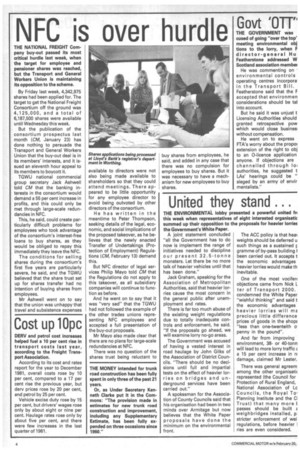NEC is over hurdle
Page 4

If you've noticed an error in this article please click here to report it so we can fix it.
THE NATIONAL FREIGHT Company buy-out passed its most critical hurdle last week, when the target for employee and pensioner shares was reached, but the Transport and General Workers Union is maintaining its opposition to the scheme.
By Friday last week, 4,342,975 shares had been applied for. The target to get the National Freight Consortium off the ground was 4,125,000, and a total of 6,187,500 shares were available until Wednesday this week.
But the publication of the consortium prospectus last month (CM, January 23) has done nothing to persuade the Transport and General Workers Union that the buy-out deal is in its members' interests, and it issued an eleventh hour appeal to its members to boycott it.
TGWU national .commercial group secretary Jack Ashwell told CM that the banking interests in the consortium would demand a 55 per cent increase in profits, and this could only be met through large-scale redundancies in NFC.
This, he said, could create particularly difficult problems for employees who took advantage of the consortium's interest-free loans to buy shares, as they would be obliged to repay this immediately they leave the NFC.
The conditions for selling shares during the consortium's first five years are particularly severe, he said, and the TGWU believed that the share trust set up for shares transfer had no intention of buying shares from employees.
Mr Ashwell went on to say that the union was unhappy that travel and subsistence expenses available to directors were not also being made available to shareholders so that they could attend meetings. There appeared to be little opportunity for any employee director to avoid being outvoted by other directors of the consortium.
He has written in the meantime to Peter Thompson, seeking details of the legal, economic, and social implications of the proposed takeover, as he believes that the newly enacted Transfer of Undertakings (Protection of Employment) Regulations (CM, February 13) demand this.
But NFC director of legal services Philip Mayo told CM that the Regulations do not apply to this takeover, as all subsidiary companies will continue to function as before.
And he went on to say that it was "very sad" that the TGWU had not followed the example of the other trades unions representing NFC employees and accepted a full presentation of the buy-out proposals.
Mr Mayo also made clear that there are no plans for large-scale redundancies at NFC.
There was no question of the shares trust being reluctant to buy shares from employees, he said, and added in any case that there was no compulsion for employees to buy shares. But it was necessary to have a mechanism for new employees to buy shares.


















































